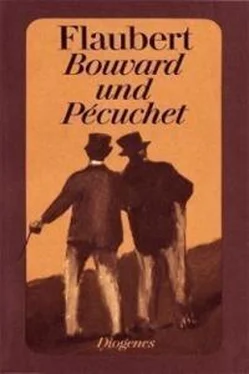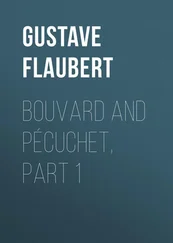Sometimes they felt a shivering sensation, and, as it were, the passing breath of an idea, but at the very moment when they were seizing it, it had vanished.
But methods exist for discovering subjects. You take a title at random, and a fact trickles out of it. You develop a proverb; you combine a number of adventures so as to form only one. None of these devices came to anything. In vain they ran through collections of anecdotes, several volumes of celebrated trials, and a heap of historical works.
And they dreamed of being acted at the Odéon, had their thoughts fixed on theatrical performances, and sighed for Paris.
"I was born to be an author instead of being buried in the country!" said Bouvard.
"And I likewise," chimed in Pécuchet.
Then came an illumination to their minds. If they had so much trouble about it, the reason was their ignorance of the rules.
They studied them in the Pratique du Théâtre , by D'Aubignac, and in some works not quite so old–fashioned.
Important questions are discussed in them: Whether comedy can be written in verse; whether tragedy does not go outside its limits by taking its subject from modern history; whether the heroes ought to be virtuous; what kinds of villains it allows; up to what point horrors are permissible in it; that the details should verge towards a single end; that the interest should increase; that the conclusion should harmonise with the opening—these were unquestionable propositions.
"Invent resorts that can take hold of me,"
says Boileau. By what means were they to "invent resorts?"
"So that in all your speeches passion's dart
May penetrate, and warm, and move the heart." [15] Que dans tous vos discours la passion emue Aille chercher le coeur, l'échauffe et le remue.
How were they to "warm the heart?"
Rules, therefore, were not sufficient; there was need, in addition, for genius. And genius is not sufficient either. Corneille, according to the French Academy, understands nothing about the stage; Geoffroy disparaged Voltaire; Souligny scoffed at Racine; La Harpe blushed at Shakespeare's name.
Becoming disgusted with the old criticism, they wished to make acquaintance with the new, and sent for the notices of plays in the newspapers.
What assurance! What obstinacy! What dishonesty! Outrages on masterpieces; respect shown for platitudes; the gross ignorance of those who pass for scholars, and the stupidity of others whom they describe as witty.
Perhaps it is to the public that one must appeal.
But works that have been applauded sometimes displeased them, and amongst plays that were hissed there were some that they admired.
Thus the opinions of persons of taste are unreliable, while the judgment of the multitude is incomprehensible.
Bouvard submitted the problem to Barberou. Pécuchet, on his side, wrote to Dumouchel.
The ex–commercial traveller was astonished at the effeminacy engendered by provincial life. His old Bouvard was turning into a blockhead; in short, "he was no longer in it at all."
"The theatre is an article of consumption like any other. It is advertised in the newspapers. We go to the theatre to be amused. The good thing is the thing that amuses."
"But, idiot," exclaimed Pécuchet, "what amuses you is not what amuses me; and the others, as well as yourself, will be weary of it by and by. If plays are written expressly to be acted, how is it that the best of them can be always read?"
And he awaited Dumouchel's reply. According to the professor, the immediate fate of a play proved nothing. The Misanthrope and Athalie are dying out. Zaïre is no longer understood. Who speaks to–day of Ducange or of Picard? And he recalled all the great contemporary successes from Fanchon la Vielleuse to Gaspardo le Pêcheur , and deplored the decline of our stage. The cause of it is the contempt for literature, or rather for style; and, with the aid of certain authors mentioned by Dumouchel, they learned the secret of the various styles; how we get the majestic, the temperate, the ingenuous, the touches that are noble and the expressions that are low. "Dogs" may be heightened by "devouring"; "to vomit" is to be used only figuratively; "fever" is applied to the passions; "valiance" is beautiful in verse.
"Suppose we made verses?" said Pécuchet.
"Yes, later. Let us occupy ourselves with prose first."
A strict recommendation is given to choose a classic in order to mould yourself upon it; but all of them have their dangers, and not only have they sinned in point of style, but still more in point of phraseology.
This assertion disconcerted Bouvard and Pécuchet, and they set about studying grammar.
Has the French language, in its idiomatic structure definite articles and indefinite, as in Latin? Some think that it has, others that it has not. They did not venture to decide.
The subject is always in agreement with the verb, save on the occasions when the subject is not in agreement with it.
There was formerly no distinction between the verbal adjective and the present participle; but the Academy lays down one not very easy to grasp.
They were much pleased to learn that the pronoun leur is used for persons, but also for things, while où and en are used for things and sometimes for persons.
Ought we to say Cette femme a l'air bon or l'air bonne ?— une bûche de bois sec , or de bois sèche ?— ne pas laisser de , or que de ?— une troupe de voleurs survint , or survinrent ?
Other difficulties: Autour and à l'entour of which Racine and Boileau did not see the difference; imposer , or en imposer , synonyms with Massillon and Voltaire; croasser and coasser , confounded by La Fontaine, who knew, however, how to distinguish a crow from a frog.
The grammarians, it is true, are at variance. Some see a beauty where others discover a fault. They admit principles of which they reject the consequences, announce consequences of which they repudiate the principles, lean on tradition, throw over the masters, and adopt whimsical refinements.
Ménage, instead of lentilles and cassonade , approves of nentilles and castonade ; Bonhours, jérarchie and not hiérarchie and M. Chapsal speaks of les oeils de la soupe .
Pécuchet was amazed above all at Jénin. What! z'annetons would be better than hannetons , z'aricots than haricots ! and, under Louis XIV., the pronunciation was Roume and Monsieur de Lioune , instead of Rome and Monsieur de Lionne !
Littré gave them the finishing stroke by declaring that there never had been, and never could be positive orthography. They concluded that syntax is a whim and grammar an illusion.
At this period, moreover, a new school of rhetoric declared that we should write as we speak, and that all would be well so long as we felt and observed.
As they had felt and believed that they had observed, they considered themselves qualified to write. A play is troublesome on account of the narrowness of its framework, but the novel has more freedom. In order to write one they searched among their personal recollections.
Pécuchet recalled to mind one of the head–clerks in his own office, a very nasty customer, and he felt a longing to take revenge on him by means of a book.
Bouvard had, at the smoking saloon, made the acquaintance of an old writing–master, who was a miserable drunkard. Nothing could be so ludicrous as this character.
At the end of the week, they imagined that they could fuse these two subjects into one. They left off there, and passed on to the following: a woman who causes the unhappiness of a family; a wife, her husband, and her lover; a woman who would be virtuous through a defect in her conformation; an ambitious man; a bad priest. They tried to bind together with these vague conceptions things supplied by their memory, and then made abridgments or additions.
Читать дальше








![Гюстав Флобер - Закат Карфагена [Сборник]](/books/414440/gyustav-flober-zakat-karfagena-sbornik-thumb.webp)


